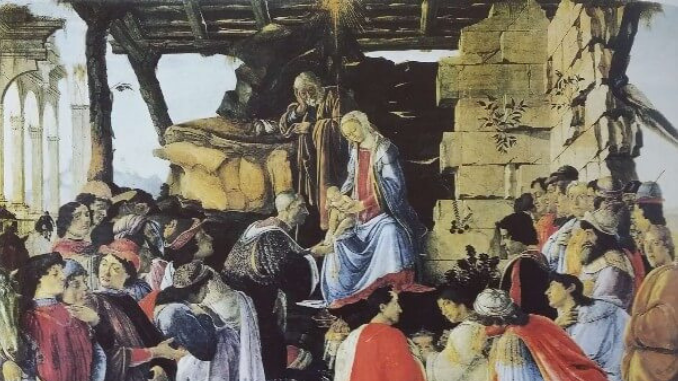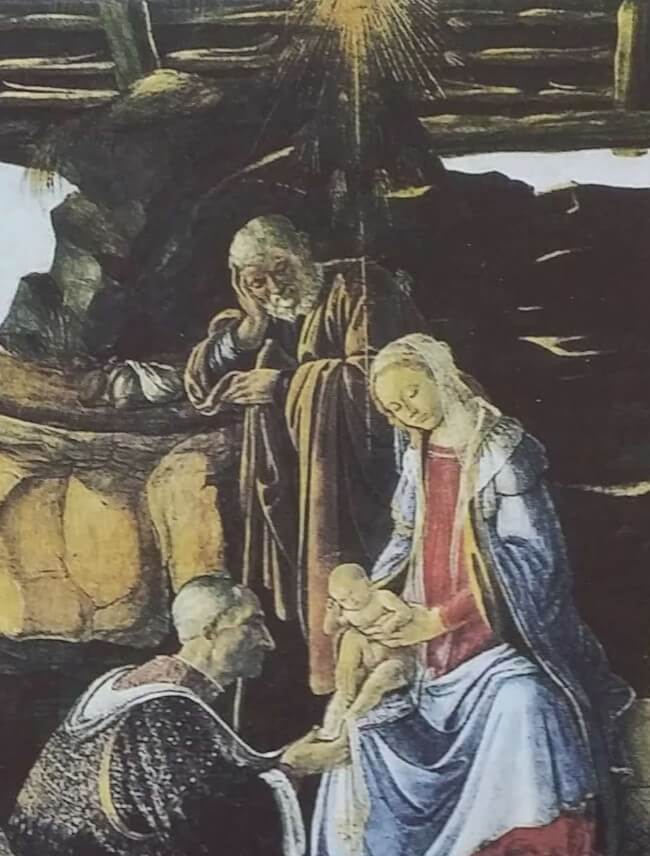
This year Epiphany falls on the first Sunday of the year, with a partial solar eclipse as the New Moon passes by.
According to Marsilio Ficino in Three Books on Life the Moon “receives a life-giving power” from the Sun each time it forms a union, and in The Book of the Sun he writes,
“…whenever the Moon is joined to the Sun, from that very heavenly configuration and degree of conjunction she announces the nature of the month to come…”
Ficino, The Book of the Sun (De Sole), Sphinx 6, p. 129
The Astrological Significance of the Epiphanic Solar Eclipse
Gray Crawford writes in a blog post about today’s eclipse,
“Similarly, in astrology eclipses are known as times in which we experience an intensification of forms entering and leaving our life. Since the partial solar eclipse in Capricorn occurring on January 5 or 6 (depending on your locality) is the first of a series of Capricorn eclipses, it will bring an amplified introduction of new themes into our life while we simultaneously need to let go of numerous aspects of our old attachments and identity.”
Gray Crawford: https://graycrawford.net/2019/01/02/solar-eclipse-in-capricorn/
An “amplified introduction of new themes” seems also to be a fitting way to describe this year’s Epiphany – the manifestation of Christ to the gentiles, a solar feast that lands on a weekly feast day – Sunday no less – in which the sun is partially eclipsed by the moon.
Ficino’s The Star of the Magi
Each year during the season of Epiphany I read Ficino’s Epiphany sermon, The Star of the Magi in which he contemplates the nature of the star, what it foretold and the symbolism of the gifts the Magi presented to Christ.
Ficino places the birth of Christ in its planetary context as interpreted by the “eastern astronomers,” i.e. the Magi themselves, or at least as he imagines it to have been interpreted, by them:
“Jupiter was in the rulership of Sagittarius. Venus, always daughter to the Sun, occupied the end of the sign of Sagittarius. This was probably the configuration of the sky in the month of December when Christ was born, if he was born after midnight. It says in the Gospel that he was born while shepherds kept their night vigil, and the angel said “Today he is born.”
Ficino, The Star of the Magi, Sphinx 6, p. 102
From this, they concluded that a king, just (Jupiter), true (Sun), and gracious (Venus) yet poor, (due to the low position of the Sun) would be born of a fertile mother (due to the ascendancy of Jupiter) who, (with the Moon in the first face of the Virgo) was also a virgin.
Yet the Magi did not know where they were going or who this child would be, or whether he was already or not yet born.
Marcus Aurelius on Ignorance
And that brings me to another happy coincidence. Today’s reading from The Daily Stoic (see yesterday’s blog post about that book) on the theme of “clarity.” The title was “Where, Who, What, and Why.” Marcus Aurelius speaks of those who, lacking any clarity, are effectively lost to themselves:
“A person who doesn’t know what the universe is, doesn’t know where they are. A person who doesn’t know their purpose in life doesn’t know who they are or what the universe is. A person who doesn’t know any one of these things doesn’t know why they are here.”
Marcus Aurelius, Meditations 8.52, in The Daily Stoic, p. 14
I doubt that this was intentional on the part of the authors of The Daily Stoic, but I see it as expressive of the darkness that overshadows us when the comet and what it directs us to is lost from view.
Perhaps this dialectic can also be expressed astrologically, as in this passage from the same blog post by Gray Crawford:
“To paraphrase some of Dane Rudhyar’s ideas on the planetary nodes, we are experiencing the essentiality of Pluto affecting our individual roots within civilization, both the putrefaction of plutonic toxicity as well as the creative empowerment that comes from claiming our inner authority within the collective chaos.”
Gray Crawford: https://graycrawford.net/2019/01/02/solar-eclipse-in-capricorn/
The later astrologers have recourse to more planets that Ficino did. The eclipse occurs between the leaden influence of Saturn and the putridity of Pluto.
The Prisca Theologia
Anyway, the comet, moved and illumined “not naturally but divinely, by the Angel Gabriel,” reappears and guides the Magi to Christ.
Here, in the heart of the sermon, we receive Ficino’s true intention; to show us that there is a reciprocal relationship between the Magi who’s star gazing sets them on their journey, and the angelic star that guides them to their destination:
“In the form of a star, [Gabriel] teaches those who study the stars, and through the light of a star, he leads those who are the Sun’s devotees to the Sun.”
Ficino, The Star of the Magi, Sphinx 6, p. 103
This is the prisca theologia; Marsilio Ficino’s Epiphany.
On the Gifts of the Magi
The Magi give gifts, and if you recall, their symbolism is beautifully described the carol, We Three Kings,

- Born a King on Bethlehem’s plain, Gold I bring to crown him again
- Frankincense to offer have I, Incense owns a Deity nigh
- Myrrh is mine, its bitter perfume, Breathes of life of gathering gloom, Sorrowing, sighing, bleeding, dying, Sealed in the stone-cold tomb
The three offices of Christ are reiterated in the final verse:
Glorious now behold Him arise
https://www.carols.org.uk/we_three_kings_of_orient_are.htm
King and God and Sacrifice
Now of course, the carol was written several hundred years after Ficino’s day, in a land that had only been discovered a few years before his death, but it is interesting to see how what we might call it’s orthodox reading of the gifts of the Magi is enriched by Ficino’s astrological sensitivity, and given a twist at the end as he turns from astrological to the domestic considerations of the holy family:
“The Astronomers gave gold to the king who had been born, since it is considered Solar, aromatic incense because it signifies the graciousness of Venus, and Myrrh because it signifies Jupiterian life that doesn’t know corruption.
“Meanwhile, in other rather mysterious ways, these ideas take a different direction; for, gold helps the poor, myrrh strengthens a weak body, and incense makes a stable pleasant. Priests give gold and incense to a king, but myrrh to God.”
Ficino, The Star of the Magi, Sphinx 6, p. 103
The final sentence of this passage jumped out at me as I read it this morning. The gift of incense and myrrh seem to have changed their positions. What’s going on? I think it is because the trinity of offices is still present, but that the sacrificial offering is now returned back to King and Deity through the agency of a human priest. That the incense is now assigned along with gold to the office of king alludes to the intercessory nature of Christ the King, whereas myrrh given alone to the godhead points to the undivided nature of the divine.
And now to bed.
